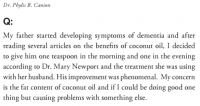Badger
Member
- Joined
- Jan 23, 2017
- Messages
- 960
A few days ago I saw on TV a Dr. Oz show examining coconut oil. Dr. Michael Roizen, MD, an anesthesiologist, say he worked years ago at the CDC , and they routinely triggered dementia in rats feeding them coconut oil. He emphatically proclaimed that people should not eat coconut oil due to such a risk. Another MD, Mark Hyman, who was brought on to counter Roizen, shot back that such results were from low-grade inferior coconut oil, and would not happen with virgin, high-quality coconut oil. Roizen replied with an analogy that if you take high or low quality cocaine, it's still cocaine, that is, it's still a poison, which he is implying about coconut oil. Roizen said the mechanism for this outcome from eating coconut oil is that it brings inflammation into the brain, leading to dementia. Almost got the sense he was saying that it somehow bores pathways into the brain for inflammation to emerge in.
Any comments on this, is coconut oil really a dementia promoter? Until this show, I have heard anecdotal stories of just the opposite: that it lessens dementia or eliminate it.
Any comments on this, is coconut oil really a dementia promoter? Until this show, I have heard anecdotal stories of just the opposite: that it lessens dementia or eliminate it.




